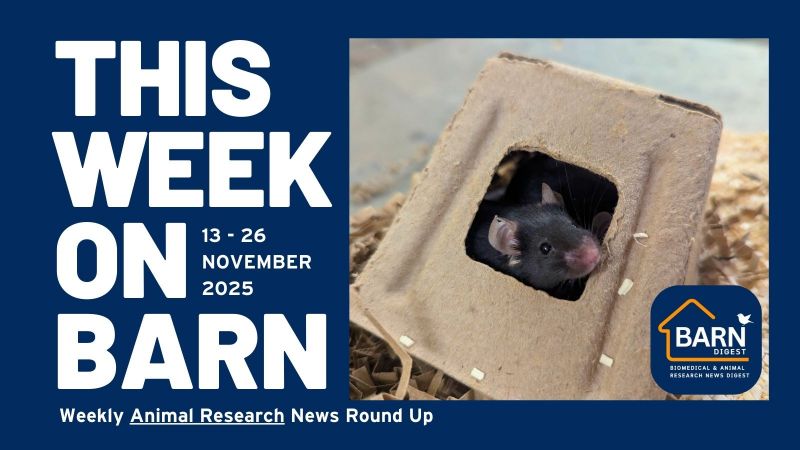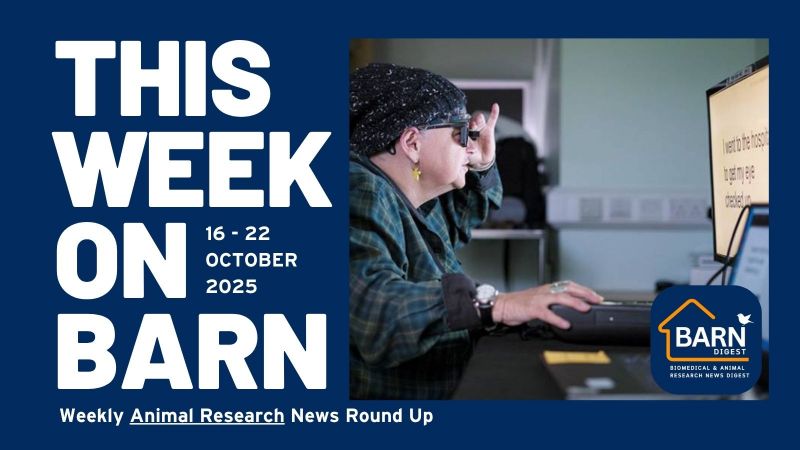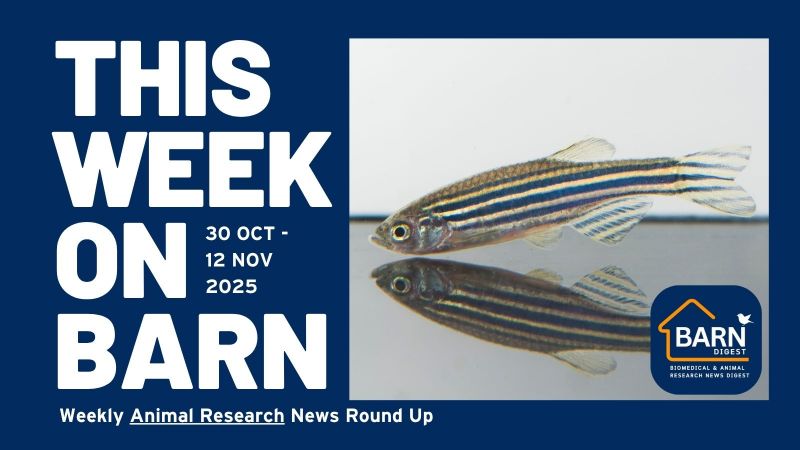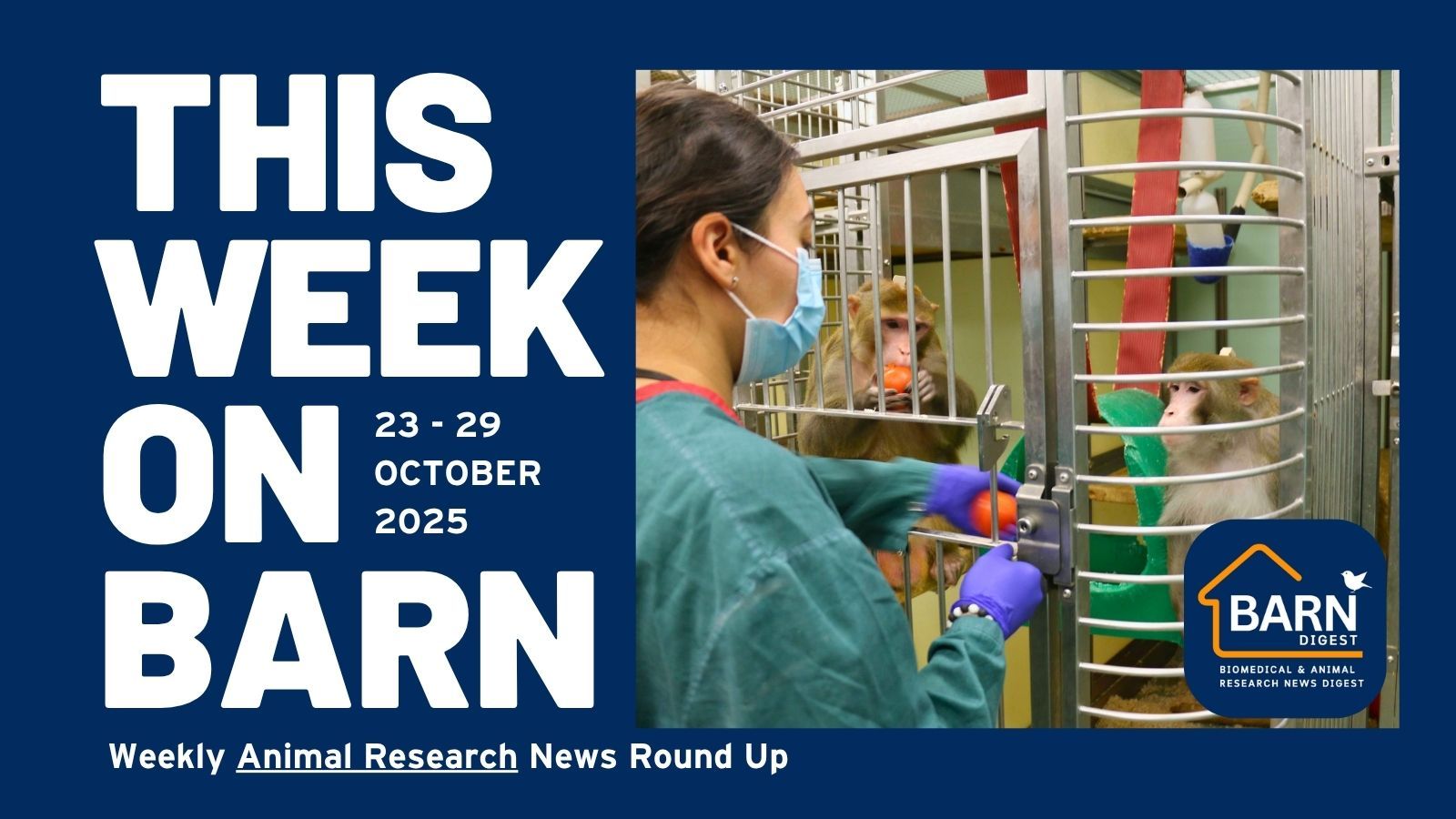
The Biomedical Animal Research News (BARN) Digest collates animal research news from UAR’s 150+ member organisations into one, easy to access, feed. These animal research related stories include topics such as: medical studies and advancements; animal welfare and 3Rs news; funding, regulatory, and policy news; and conservation and environmental research that involves animal testing.
Each week, we pick the most interesting, groundbreaking, and important news to feature in a weekly news roundup. In this round up we feature news stories from 23-29 October 2025.
View BARN to see daily news updates from UAR members.
CLINICAL TRIALS/HUMAN MEDICINES
First UK patient uses thought to control computer hours after Neuralink implant
UCL | HUMAN CLINICAL TRIALS
The Neuralink device was tested in rats, mice, sheep, pigs and monkeys before moving to human trials.
"A patient with motor neurone disease was able to control a computer just by using his thoughts following the UK’s first Neuralink implant surgery in a study led by UCL and UCLH clinical researchers.
The surgery is part of the GB-PRIME study evaluating the safety and functionality of Neuralink’s robotically implanted brain-computer interface (BCI), which aims to improve independence for people who are paralysed.
The surgery, which took place at UCLH’s National Hospital for Neurology and Neurosurgery (NHNN) in October 2025, went as planned, and on the day following the procedure, the patient was able to begin using their BCI implant to move a computer cursor with their thoughts and to return home from the hospital.
The Chief Investigator for the study, Mr Harith Akram, UCLH consultant neurosurgeon at the NHNN and Honorary Clinical Associate Professor at UCL Queen Square Institute of Neurology, said: “This treatment has the potential to help thousands of patients trapped in their own bodies, for whom we have previously been able to offer very little. Patients volunteering for the study are courageous and inspiring and we thank them for their contributions to advancing healthcare."
UK patient first to trial CAR T cell therapy to treat multiple sclerosis
UCL | HUMAN CLINICAL TRIALS
CAR T cell therapy has been tested in mice, rats, dogs, and monkeys.
"A multiple sclerosis (MS) patient in the UK was the first to receive CAR T cell therapy, invented by UCL researchers, in a clinical trial testing whether this personalised treatment can slow or even halt the progression of the disease.
Emily Henders, 37, of Bushey in Hertfordshire, received her infusion at UCLH in October 2025 and is looking forward to being discharged from hospital.
She said: “I hope taking part in the trial means I will never have to experience another relapse and that my MS symptoms will not progress. I know it is still experimental but it offers a scientific rationale which, as a biology teacher, makes sense to me.”
There is no cure for MS, and while there are several treatments available to help manage symptoms or slow the progression of the disease, none are fully effective in preventing relapses or the long-term progression of the condition.
But with a CAR T cell therapy (obecabtagene autoleucel, known as obe-cel) proven to be highly effective in blood cancer patients, researchers have turned their attention to autoimmune conditions such as lupus and now MS."
DRUG DEVELOPMENT
New drug could help prevent sight loss in people with diabetes
QUEEN'S UNIVERSITY BELFAST | RATS
"A study, led by Queen’s University and funded by Diabetes UK, suggests that a new drug treatment could help protect people with diabetes from sight loss.
Using a rat model of diabetes, the team tested a drug called 2-HDP and found that it protected the retina’s nerve cells and blood vessels, reduced inflammation, and helped preserve visual function. The drug works by neutralising harmful molecules that accumulate in the retina during diabetes and contribute to sight loss.
To support the importance of these findings to humans, the team also looked at retinal tissue from people with diabetes and found the presence of the same toxic molecules targeted by 2-HDP. This suggests that the drug may have the potential to target these damaging molecules in people as well."
https://www.qub.ac.uk/News/Allnews/featured-research/new-drug-help-prevent-sight-loss-diabetes.html
BASIC/DISCOVERY RESEARCH
New antibody restricts the growth of aggressive and treatment-resistant breast cancers
KING'S COLLEGE LONDON | MICE
"A new potential antibody therapy strategy which restricts the growth of treatment-resistant breast cancers has been developed by scientists.
In their latest study, laboratory experiments and animal models revealed the modified antibody bound immune cells more strongly compared to current treatments. This activated the immune cells already present in the tumour to attack it, limiting the growth of tumours in triple-negative and treatment-resistant breast cancers.
The researchers also found that the modified antibody activated immune cells circulating in the bloodstream, which could boost the body’s overall ability to detect and fight cancer."
Early trigger of diabetic eye disease identified
UCL | MICE
"A team led by UCL scientists has identified a key protein that triggers diabetic retinopathy – a condition caused by high blood sugar damaging the retina’s blood vessels and a leading cause of sight loss among working-age adults.
The research in mice, funded by Diabetes UK, Moorfields Eye Charity and Wellcome, has the potential to revolutionise how the disease is treated, shifting the treatment from managing late-stage damage to preventing vision loss before it begins.
The findings published in Science Translational Medicine reveal that a protein called LRG1 plays a critical role in initiating the earliest stage of retinal damage after diabetes develops. LRG1 causes the cells that wrap around the eye’s smallest blood vessels to constrict excessively and ‘squeeze’ them, reducing oxygen supply to the retina and laying the groundwork for long-term visual impairment.
Importantly, when researchers blocked LRG1 activity in mouse models of diabetes, they were able to prevent this early damage and preserve healthy eye function."
https://www.ucl.ac.uk/news/2025/oct/early-trigger-diabetic-eye-disease-identified
Animal instincts: Exploring nature’s oncologist
CANCER RESEARCH UK | WHALES, ELEPHANTS, NAKED MOLE RATS
"Can we pick apart how evolution has suppressed cancer in some species? Alex Cagen is attempting exactly that by going beyond mouse models… way beyond. Shannah McGauran sat down with him to talk Peto’s Paradox, whales and naked mole rats…"
https://news.cancerresearchuk.org/2025/10/27/animal-instincts-exploring-natures-oncologist/
RESEARCH INTEGRITY
Considering research reproducibility in harm-benefit analysis
NC3R'S | REPRODUCABILITY
"NC3Rs staff have co-authored a new chapter in the IACUC Handbook to support ethical review bodies in assessing the reliability of animal research."
https://nc3rs.org.uk/news/considering-research-reproducibility-harm-benefit-analysis
ANIMAL RESEARCH STATISTICS RELEASED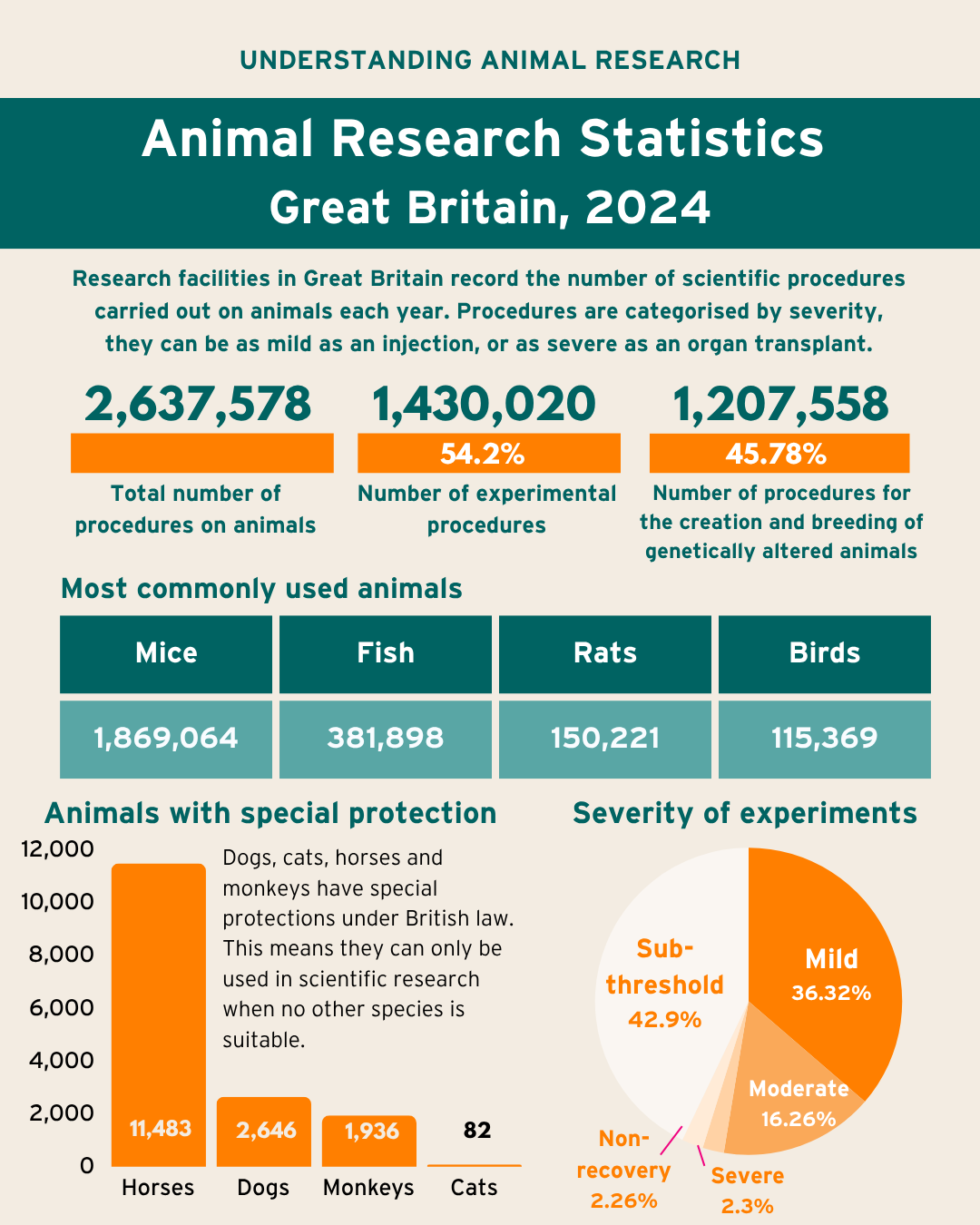
Animal research statistics for
Great Britain, 2024
UAR | ANIMAL STATS
Latest figures show a decrease in animals used in research in 2024
-
Number of procedures on animals in 2024 has decreased by 1.6% to 2.64 million
-
Lowest number of procedures since 2001
-
Mice, fish, rats, and birds account for 95% of all procedures
-
Cats, dogs, and monkeys account for 0.2% of all procedures
-
Sub-threshold and mild procedures account for 79%
Ten organisations account for half of all animal research in Great Britain in 2024
UAR | ANIMAL STATS
Ten organisations account for half of all animal research in Great Britain in 2024
- 99% of procedures carried out in mice, fish, rats, and birds
- 82% of procedures caused pain equivalent to, or less than, an injection
- 72 research institutions and funders have proactively shared their 2024 animal research statistics
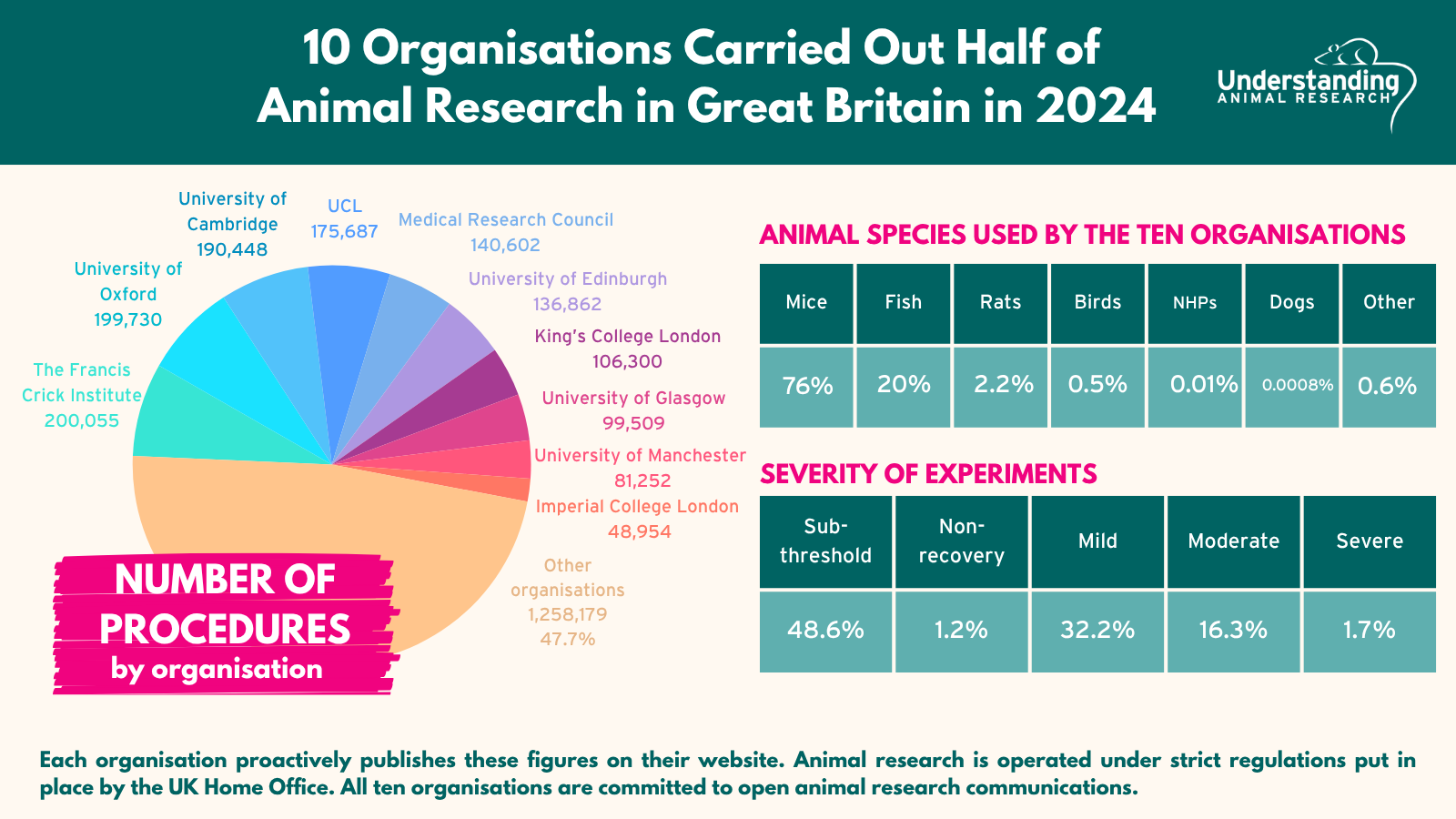
Visit BARN for daily news updates
Last edited: 29 October 2025 11:26


